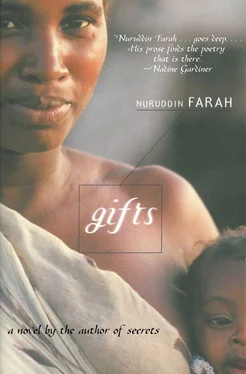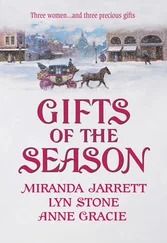Nuruddin Farah - Gifts
Здесь есть возможность читать онлайн «Nuruddin Farah - Gifts» весь текст электронной книги совершенно бесплатно (целиком полную версию без сокращений). В некоторых случаях можно слушать аудио, скачать через торрент в формате fb2 и присутствует краткое содержание. Год выпуска: 2011, Издательство: Arcade Publishing, Жанр: Современная проза, на английском языке. Описание произведения, (предисловие) а так же отзывы посетителей доступны на портале библиотеки ЛибКат.
- Название:Gifts
- Автор:
- Издательство:Arcade Publishing
- Жанр:
- Год:2011
- ISBN:нет данных
- Рейтинг книги:3 / 5. Голосов: 1
-
Избранное:Добавить в избранное
- Отзывы:
-
Ваша оценка:
- 60
- 1
- 2
- 3
- 4
- 5
Gifts: краткое содержание, описание и аннотация
Предлагаем к чтению аннотацию, описание, краткое содержание или предисловие (зависит от того, что написал сам автор книги «Gifts»). Если вы не нашли необходимую информацию о книге — напишите в комментариях, мы постараемся отыскать её.
Gifts — читать онлайн бесплатно полную книгу (весь текст) целиком
Ниже представлен текст книги, разбитый по страницам. Система сохранения места последней прочитанной страницы, позволяет с удобством читать онлайн бесплатно книгу «Gifts», без необходимости каждый раз заново искать на чём Вы остановились. Поставьте закладку, и сможете в любой момент перейти на страницу, на которой закончили чтение.
Интервал:
Закладка:
“Why?” Mataan asked.
Nasiiba pretended not to hear his question and turned to Bosaaso, who in turn asked, “You say no one saw you?”
“I mean no one followed me here, not that it matters anyway.”
Mataan had another question. “Did you bring him away in a plastic carrier-bag in which you made holes, or what?” He was clearly being wicked. “And why steal him in the first place?”
“What business is it of yours to ask me these questions?”
“It is as much my business to ask as it is yours to bring home a foundling without seeking anyone’s opinion.” Mataan was calm. “It is my business because if he stays here to share what little space we have or cries at night and we lose sleep, well, then, you see, my darling twin-sister, it is my business and Mother’s as well.”
A smile darkened Duniya’s eyes. Bosaaso was impressed by Mataan; unthinkingly, he touched the young man’s elbow, as if congratulating him on the delivery of a long speech. Nasiiba stood at an angle to them, her body leaning towards the wall in a rather unbalanced manner. “What if I refuse to tell you any more?” she said to Mataan.
“You won’t because that won’t do.”
Nasiiba was defiant: “You can’t make me say more than I want.”
Mataan looked in the direction of his mother, seeking her guidance. Several expressions spanned Duniya’s face, partitioning it into segments of sadness and exaltation. She said nothing.
Nasiiba spoke to Bosaaso, who was most attentive, “It was very exciting coming home, bringing him with me. He only weighs a few pounds. I felt as if I were taking illicit notes into an examination hall despite the presence of suspicious invigilators.”
“Where did you get the nappy and feeding-bottle?” asked Mataan.
“A neighbour gave them to me.”
“A lie has a short leg, Naasi,” Mataan said, “and it doesn’t run as fast as a truth, which will catch up with it sooner or later. I suspect there is little truth in what you are telling us.”
At that point Duniya said, “I wish we could take him to the hospital, have him seen by a paediatrician.”
Nasiiba was worried. “Is anything the matter with him, Mummy?”
“We all have visible and invisible wounds,” said Duniya, applying penicillin-cream on the child’s navel area, “and some wounds are curable, some not.”
That the foundling’s navel was infected had been noticed by everyone in the room, for Somalis associate the area with the she-camel that parents allot to new-born baby boys, in a sense the first potlach a male child receives. Somalis tie the umbilical cord at both ends with a hair plucked from the gift-camel’s tail. No such present had been offered to the Nameless One.
“We can take him to the hospital, can’t we?” Nasiiba inquired. She turned to Bosaaso. “You have a car — you don’t mind giving us a lift, do you?”
Mataan said, “There’s no point.”
“Why not?” Nasiiba challenged her twin.
“We can only take him after we’ve registered his existence with the police authorities,” Bosaaso explained.
“That’s typical men’s logic,” said Nasiiba, “ridiculous!”
“It’s in the nature of bureaucracy to be self-propagating.” Bosaaso continued. “First the Nameless One must exist. To exist he requires papers. To acquire these he must have names. To have these he must have parents, to whose identities he may be traced. Only then will the bureaucracy of a hospital deal with him.”
“We must do something,” Nasiiba said, and appealed to her mother: “Please make someone do something.”
“Off you go then, you men,” Duniya said to Mataan and Bosaaso.
Mataan and Bosaaso left. When Duniya looked up she realized that Nasiiba was preparing to leave. Did she not want to be alone with her mother for fear of being pressed to tell all she knew about the foundling? Duniya asked, “Where are you going, Naasi?”
“I won’t be long.”
She nearly asked her daughter to pass on her best regards to the baby’s mother and assure her that he would be taken very good care of. But she didn’t speak; her stare was fixed on a dragon-fly that had come into the room. And Nasiiba left.
The dragon-fly flew out of the window by which it had entered, but not before paying its respects to the foundling, above whom it hovered for a few moments and whose forehead it touched with its feet — in a gesture of blessing him?
Nasiiba and the dragon-fly had not been gone a minute when the Nameless One began to cry so heartily Duniya wondered if he were missing her daughter’s odour or the fly’s presence. The foundling cried as if possessed, dominating Duniya’s consciousness as no other baby had ever done before, not even one of her own. He threw into his performance all that he was capable of, coughing, sneezing, burping and wetting himself into the bargain. For the first time in her life, Duniya did not want to be alone with a baby She wished someone else were present to lend a hand, to share her agony, to bear testimony to what was happening.
Her prayer was answered. A woman was shouting, “ Hoodi-hoodi ” Duniya kept repeating the customary welcome, “ Hodeen, ” but no voice was loud enough to drown the foundling’s passionate fury An elderly woman, stooped with advanced years, entered. Duniya was pleased to see her. She remembered the woman as a neighbour, but not her name.
The old woman said, “So here you are, Little One,” touching the baby’s tear-wet cheeks and smiling. “Everyone in the neighbourhood is talking about you and how generous Duniya is, considering the times we are in and all, and you cry when you have no reason to.”
The foundling fell silent, listening to the old woman’s teasing remarks as though he understood every word. Something was becoming obvious to Duniya: the Nameless One missed human voices, not bodily contact. Was it possible that there had been the uninterrupted hum of human talk from the instant he was born? Duniya did not recall Nasiiba mentioning him crying when the curious old women talked to one another; certainly, he had not cried when there were four adults in this room debating what to do about him.
“He is all right,” the old woman said, “isn’t he?”
“Yes. He is.”
“You are very generous,” she told Duniya, “God bless you.”
Duniya felt awkward and self-conscious. It was then that she noticed that the old woman had a long hair on her upper lip, a singular hair looking out of a mole, dark as the most fertile of earths. Duniya couldn’t help focusing on the hair, active as an insect’s antennae, as the old woman spoke. “My grand-daughter goes to the same school as your twin-daughter, so that is how I know you. Maybe you know my granddaughter, the one with the non-Somali name — Marilyn. You won’t believe it, but she was named for me, and my own is Maryam. She tells me that Marilyn is the name of a famous actress who’s now dead. You know the young these days, bringing mysteries and foreign ways into our lives.”
“Yes, I know Marilyn,” said Duniya.
The old woman sat on the chair Duniya indicated. “J have come to offer our house’s blessing. I have come ahead of the others to tell you not to hesitate to ask if you need someone to look after the baby when you go to work and your children to school,” said the old woman.
“It’s very kind of you to make such a welcome offer, which I am glad to accept.” And Duniya saw the old woman eyeing the baby with understandable anxiety.
“We have lots of help,” said the woman. “There are a number of young girls in our house; we can always raise a couple more hands if necessary. So please do not hesitate to come when you need somebody to relieve you.”
Duniya assured her, “I won’t hesitate. Thank you.”
Читать дальшеИнтервал:
Закладка:
Похожие книги на «Gifts»
Представляем Вашему вниманию похожие книги на «Gifts» списком для выбора. Мы отобрали схожую по названию и смыслу литературу в надежде предоставить читателям больше вариантов отыскать новые, интересные, ещё непрочитанные произведения.
Обсуждение, отзывы о книге «Gifts» и просто собственные мнения читателей. Оставьте ваши комментарии, напишите, что Вы думаете о произведении, его смысле или главных героях. Укажите что конкретно понравилось, а что нет, и почему Вы так считаете.











